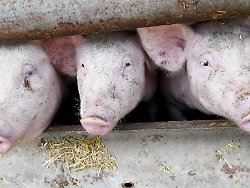Saturday 17th July 2021
Swine fever is spreading
Consequences for meat export “not excluded”
Not only wild boars, but also domestic pigs are now infected by African swine fever in Germany. After two stops, another company in Brandenburg is affected. The federal government continues to rely on meat exports from disease-free regions. The EU agriculture ministers will discuss on Monday.
In Brandenburg, African swine fever (ASF) has been found in domestic pigs on a third farm. The Federal Ministry of Agriculture in Berlin announced that it was a small business in the Märkisch-Oderland district. Two fattening pigs have already died and two sick animals should have been killed. The Friedrich Loeffler Institute has proven the epidemic.
African swine fever was first detected in domestic pigs in Germany on Thursday: on an organic farm with 200 animals in the Spree-Neisse district and a farm with only two pigs in Märkisch-Oderland. The animals were killed.
The disease is almost always fatal in pigs, but it is harmless to humans. It can be transmitted through direct contact between animals or indirectly through contaminated objects such as shoes or discarded food.
Last September there was the first confirmed case in Germany of a wild boar in Brandenburg, which raised fears of export restrictions and major economic damage among pig farmers. Since then, ASF cases have also been confirmed in wild boars in Saxony. Protective measures have been taken in the affected areas: exclusion zones have been set up and fences have been built. This was to prevent the virus infection from spreading to domestic pigs from wild boars. Brandenburg’s state government, citing experts, has so far assumed that the virus could have been introduced via wild boars from Poland.
EU agriculture ministers discuss Monday
The Federal Ministry of Agriculture gave the all-clear for the meat trade with reference to the regionalization principle and meat export from disease-free regions. The possibility of trade in pigs and pork within the EU continues, as the affected domestic pig herds are in the same regions, said a spokeswoman. The ministry had successfully advocated a concept with the EU that would allow the export of pork from areas free from African swine fever.
After African swine fever appeared in Germany last year, numerous countries outside the EU – including China, South Korea and Japan – stopped pork imports from all over Germany. With countries like Vietnam, Singapore and Canada, however, according to the spokeswoman, regionalization – exporting from disease-free areas – could be achieved. With them, the trade should in principle still be possible in ASF cases in domestic pigs, she said. With Brazil, Argentina, South Africa and South Korea it was also possible to obtain exemptions from the complete export ban for treated or processed pork products or products from pork.
At the same time, the spokeswoman for the Ministry of Agriculture added: “Although the safe trade in pork and pork products is still guaranteed, it cannot be ruled out that, given the current situation, third countries will impose further trade restrictions”. The EU agriculture ministers are also expected to speak about outbreaks of African swine fever at their council on Monday. It was initially unclear how the pork price would develop.
After the first cases of African swine fever in domestic pigs in Germany, the umbrella association of pig farmers called for slaughterhouses and trading groups to show solidarity with farmers. Torsten Staack, managing director of the interest group of pig farmers (ISN), told the “Neue Osnabrücker Zeitung” (NOZ): “The farmers are already making a loss of 30 to 40 euros per pig, while others are filling their pockets. I expect the meat industry, trade and gastronomy, not to further aggravate the need. ” There is no economic reason to lower the payout prices even further now.
.
